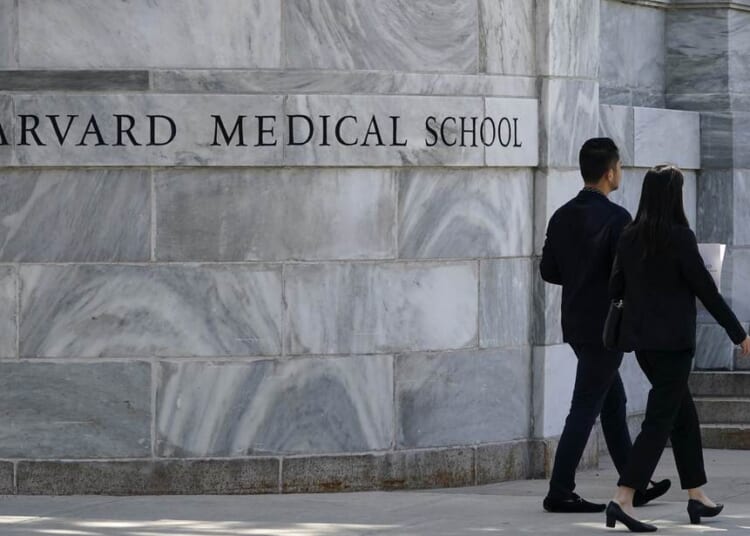Harvard can’t catch a break.
Not that I feel sorry for them. The university is getting what it asked for, good and hard. They look down at the plebs with disgust because, after all, Harvard has all the credentialed smart people, so they can’t complain when others point out that those credentialed and smart people don’t actually deserve the respect they get.
The Dana-Farber Cancer Institute, a Harvard Medical School affiliate, is seeking retraction of six studies co-authored by top researchers in a review of more than 50 papers—including work by the hospital’s CEO https://t.co/t09ImSJPQlhttps://t.co/t09ImSJPQl
— The Wall Street Journal (@WSJ) January 22, 2024
The latest scandal arose due to academic misconduct at the Harvard teaching hospital, more specifically, the Dana-Farber Cancer Institute.
It turns out that some of their researchers, including the chief of the Institute, were very naughty scholars. And, unlike Claudine Gay, the research misconduct they engaged in was in an area that actually matters, not some DEI papers that nobody either reads or cares about.
The Dana-Farber Cancer Institute, a Harvard Medical School affiliate, is seeking to retract six studies and correct 31 other papers as part of a probe involving four of its senior cancer researchers and administrators.
More than 50 papers, including four co-authored by Chief Executive and President Dr. Laurie Glimcher, are part of a continuing review, according to Dr. Barrett Rollins, the cancer institute’s research-integrity officer. Some requests for retractions and corrections have already been sent to journals, he said. Others are being prepared. The institute has yet to determine whether misconduct occurred.
Also under investigation are papers co-authored by Chief Operating Officer Dr. William Hahn; Director of the Clinical Investigator Research Program Dr. Irene Ghobrial; and Dr. Kenneth Anderson, program director of the Jerome Lipper Multiple Myeloma Center.
All four researchers have faculty appointments at Harvard Medical School, making it the latest tranche of misconduct allegations leveled at Harvard researchers. Claudine Gay resigned as Harvard University president early this year, facing allegations of plagiarism. Last year, Harvard Business School placed Prof. Francesca Gino on administrative leave after accusations that her work contained falsified data.
I don’t know about you, but when I hear “research misconduct” and “cancer” in the same sentence and I get worried. Throw in “medical school,” and chills go down my spine.
As of now I don’t know the seriousness of the misconduct, although retracting papers is a very big deal. Sometimes errors creep into a paper and corrections need to be made–it is science, after all, and often collaborative. Corrections happen. Retractions? Not so much. Researchers like to retract papers even less than newspapers like admitting to making an error. If you ever try to force a paper to make a correction you know what I mean. Pulling teeth.
Dana-Farber’s disclosure about its probe arrived after a data sleuth pointed to irregularities in the researchers’ papers.
In early January, molecular biologist Sholto David published a blog post describing what he said were signs of image manipulation in papers by the Dana-Farber researchers. David contacted Dana-Farber and Harvard Medical School with his concerns, submitting a list of papers he said contained problems.
The most serious, he said, had to do with images of experimental results that had signs of copy-and-pasting by software such as Adobe Photoshop. “Those are pixel-perfect matches for the same area, but it’s supposed to be a different sample,” he said.
Scientific studies are assessed by experts in the field for quality before they are published in peer-reviewed journals, but the process doesn’t reliably catch fabrications or errors. As a stopgap, some scientists have taken up policing the scientific record on their own, often posting their findings on social media or the scientific discussion forum PubPeer. David has been looking for faulty papers and posting about them for nearly three years.
I simply don’t know enough to judge whether the errors would affect patient care or direct future research in the wrong direction, but you have to admit that this is a bad look for Harvard and for the reputation of “experts” in general.
And, given Harvard’s complete lack of humility in dealing with others, it is hardly in a position to beg for mercy when accusations of misconduct pop up, or when actual misconduct is demonstrated. Harvard throws its weight around based on a reputation for being the best of the best, and it really needs to be cut down to size.
This is especially true because it uses the power it has to crush others who dissent from the Party line–some Harvard types can be bullies, and bullies need to be brushed back.
This isn’t to say that Harvard doesn’t employ some of the best and the brightest–it does. But they should be respected on the merits of their work, not their Harvard pedigree. The credential shouldn’t matter in the least, and devaluing it would be a positive social good. If a brilliant scholar is at Harvard or Idaho State, it shouldn’t matter, but it does because Harvard has a reputation and one that it currently doesn’t deserve.
Credentialism is a cancer on our society–and I’m glad to see that its power may be eroding.

